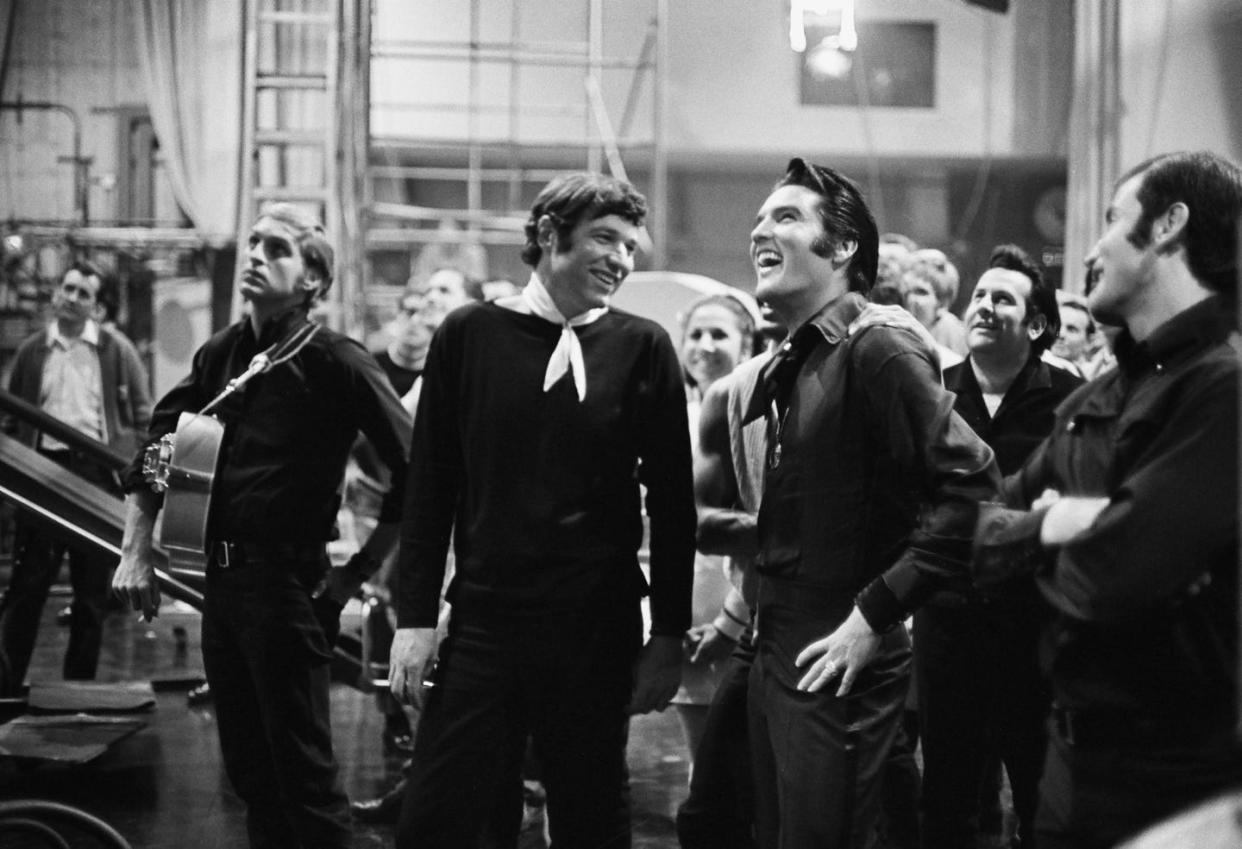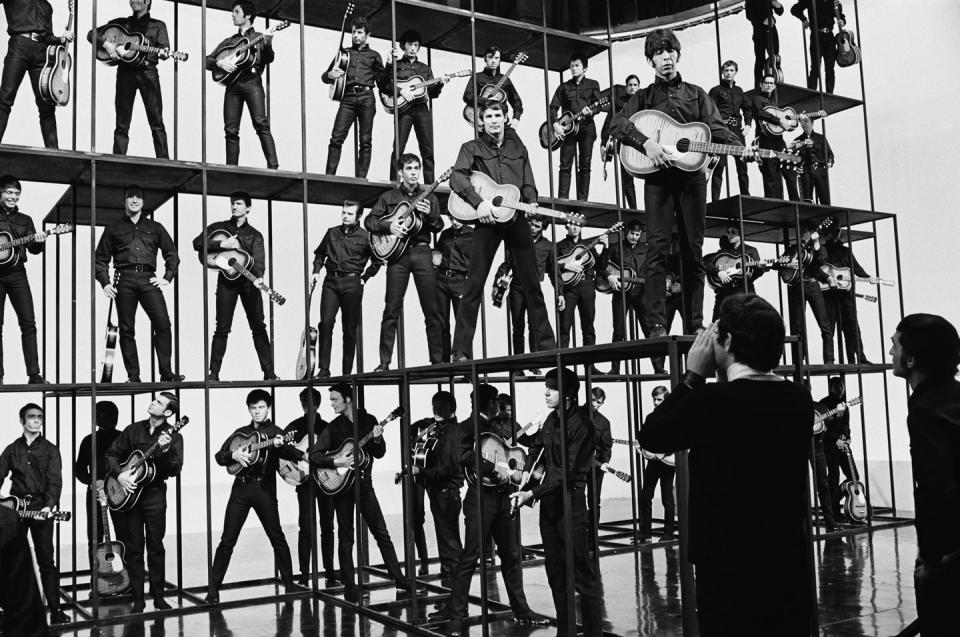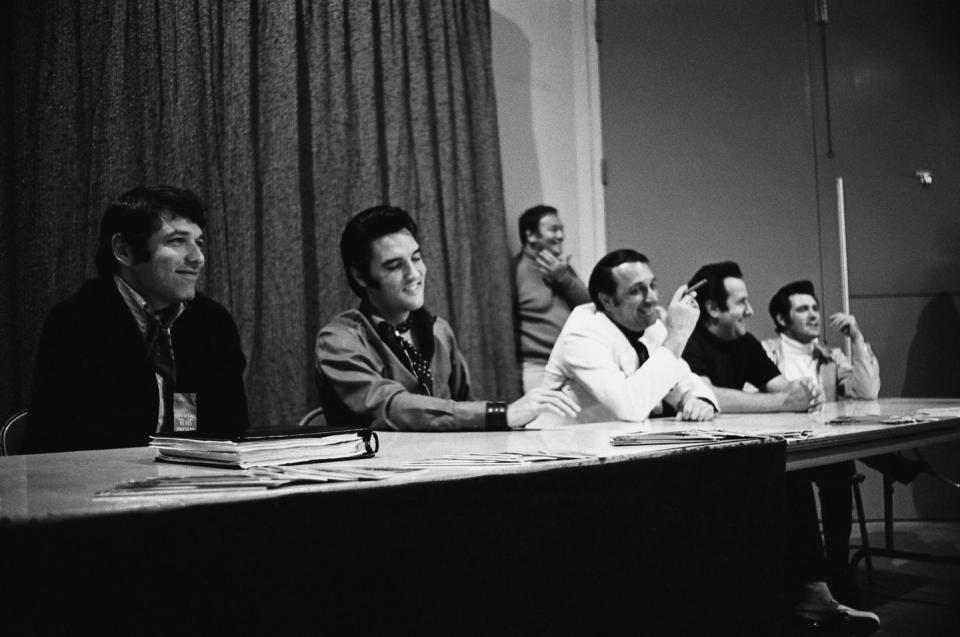This Producer Pulled Elvis Presley’s Career Out of “The Toilet” with the ‘68 Comeback Special
- Oops!Something went wrong.Please try again later.
- Oops!Something went wrong.Please try again later.

"Hearst Magazines and Yahoo may earn commission or revenue on some items through these links."
Before production began on his 1968 TV special, Elvis Presley spent an hour talking with Steve Binder, the music and television producer who had been chosen to direct the project. Presley, then 32, asked a direct question: “What do you think of my career?”
Binder, 35, gave a frank answer: “I think it’s in the toilet.”
Few would dare speak to the King of Rock ’n’ Roll in this way, but to Presley, the answer was refreshing. “Well finally, somebody’s talking straight with me,” he responded. From that moment on, he knew that he could work with Binder, and the two developed a trust and rapport.
The result of their collaboration came to be known as the ’68 Comeback Special, a one-hour concert program that aired on NBC on December 3. The now-legendary television moment is the subject of the new documentary Reinventing Elvis: The ‘68 Comeback, which is now streaming on Paramount+.
Stay up-to-date on all the latest Elvis Presley news with our free newsletter.
The special marked Presley’s return to live performance after seven years of focusing on mediocre movie roles. It restored his self-confidence and put his career—if only temporarily—back on track. But it almost didn’t turn out that way, and it might not have if not for the shared vision Presley and Binder had for the project.
Colonel Tom Parker, Presley’s famously controlling and bullheaded manager, wanted a more conventional Christmas special, the kind of milquetoast program many other singers had done before. Presley and Binder had something else in mind. After a meeting to discuss the project, Presley publicly sided with his manager to keep up appearances, according to Careless Love: The Unmaking of Elvis Presley by Peter Guralnick. But after leaving his office, Presley jabbed Binder in the ribs and made clear what he thought of Parker’s ideas: “F–– him.”
The Right Man for the Job
By May 1968, Presley was at a personal and professional low point. He had gained weight, grown disillusioned with his repetitive movie roles, and felt he was fading into irrelevance as bands like The Beatles and The Rolling Stones eclipsed his popularity.
Parker had been negotiating with NBC for a holiday television special with Presley crooning out Christmas songs in the style of Andy Williams or Perry Como. But NBC Producer Bob Finkel could see that concept held little appeal for Presley. According to Guralnick, Finkel said Presley was “not interested in what Colonel Parker has to say about this show; he wants everyone to know what he can really do.”
Finkel decided to offer the director job to Binder, who had a rebellious streak he thought might appeal to Presley and help overcome the divide between the singer and his manager. Binder had been making a name for himself in television production over the previous decade and had directed a concert film with singer Leslie Uggams, one of the first to be shot with light handheld equipment, according to Guralnick.
Binder wasn’t sold on the idea, at first. He wasn’t particularly interested in Presley and preferred contemporary music like The Beatles and The Beach Boys. But he was attracted to the creative freedom Finkel offered him, and he was soon drawn to the idea of creating something of genuine consequence and lasting importance.
When Binder asked Presley what he thought of that idea, according to Guralnick, Presley replied, “Scared to death.” But he was on board.
Creating Something of Consequence

Conceived as a musical retelling of Presley’s life and career through music, the Comeback Special featured a range of Presley’s songs, including hits like “Heartbreak Hotel,” “Hound Dog,” and “Jailhouse Rock.”
Once again donning his iconic leather jacket, Presley switched back and forth between intimate songs performed close to live audience members and elaborate numbers featuring huge set pieces and many costumed backup dancers. Binder encouraged him to perform as if it were a live concert, saying “It’s OK to sweat, it’s OK to have your hair mussed up,” according to Guralnick.
Presley looked alive and reinvigorated in ways he hadn’t in years during practices and performances, but behind the scenes, he was a nervous wreck. “Elvis asked me, ‘What happens if I bomb?’” Binder told Vanity Fair. “I said, ‘Elvis, you’ll still be remembered for your movies and all your early hit records… If it’s successful, every door that was closed to you will reopen.’ Which is exactly what happened.”
Parker continued to try exerting some creative control, insisting upon ending the show with a Christmas song that could serve as a radio hit during the holiday. But Binder pushed back, instead encouraging Presley to make a more personal statement, inspired by conversations they had about how saddened Presley was by the recent murders of Martin Luther King Jr. and Robert Kennedy.
The resulting song, written specifically for the special was “If I Can Dream,” a number so moving that the backup vocalists were in tears after Presley sang it. Parker had objected to it, declaring it wasn’t an Elvis kind of song, but Presley insisted, “Let me give it a shot, man.” The closing number was one of the most memorable parts of the special.
The Resulting “Elvisaissance”

The Comeback Special proved to be a huge hit, drawing positive reviews and topping the Nielsen ratings. For Presley, it led to what Vanity Fair called a “brief but shining Elvisaissance.” Pressley returned to touring and made one of his most celebrated albums, From Elvis to Memphis (1969), and recorded such hits as “In the Ghetto” and “Suspicious Minds.”
When Presley began his residency at the Las Vegas International Hilton, Binder, now 90, was there for the first performance. “I thought he was fantastic,” he said. “I sat in the back of the room and saw him having as much fun, if not more, than when he did our special… Then I went to see him a few years later, [and] I knew instantly it was all over.”
Binder and Presley had wanted to collaborate more after the success of the television special, and Presley provided him a phone number, but when Binder called it he was told it was the wrong number. Binder believed it was Parker’s interference that prevented them from maintaining contact.
“The Colonel, viewing the young director as an interloper, knew how to close doors,” wrote Glen Jeansonne in Elvis Presley, Reluctant Rebel: His Life and Our Times. Binder never worked with nor saw Elvis again, right up until the singer’s death in 1977.
Watch Reinventing Elvis: The ’68 Comeback Now
Reinventing Elvis: The ’68 Comeback features interviews with Steve Binder, fans who attended the special, and other Elvis experts. Darius Rucker, Maffio, and other contemporary musicians also perform. The documentary is now streaming on Paramount+.
You Might Also Like

